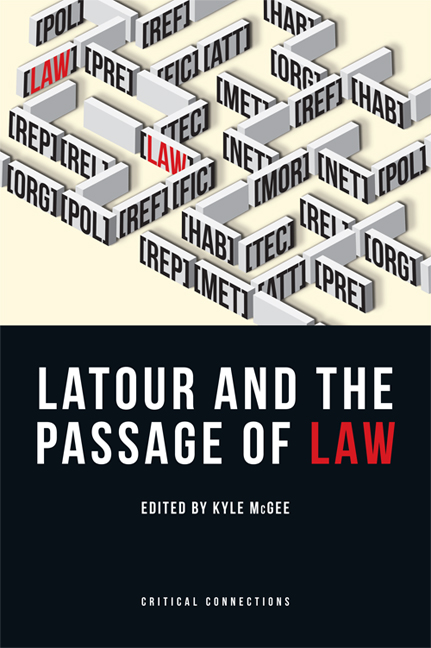Book contents
- Frontmatter
- Contents
- Introduction
- 1 From the Conseil d’État to Gaia: Bruno Latour on Law, Surfaces and Depth
- 2 Politics and Law as Latourian Modes of Existence
- 3 On Devices and Logics of Legal Sense: Toward Socio-technical Legal Analysis
- 4 ‘The Crown Wears Many Hats’: Canadian Aboriginal Law and the Black-boxing of Empire
- 5 Providing the Missing Link: Law after Latour's Passage
- 6 The Life and Deaths of a Dispute: An Inquiry into Matters of Law
- 7 Plasma! Notes on Bruno Latour's Metaphysics of Law
- 8 The Conditions of a Good Judgment: From Law to Internal Affairs Police Investigations
- 9 In The Name of the Law: Ventriloquism and Juridical Matters
- 10 Laboratory Life and the Economics of Science in Law
- 11 Bartleby, Barbarians and the Legality of Literature
- 12 The Strange Entanglement of Jurimorphs
- List of Contributors
- Index
8 - The Conditions of a Good Judgment: From Law to Internal Affairs Police Investigations
Published online by Cambridge University Press: 05 September 2016
- Frontmatter
- Contents
- Introduction
- 1 From the Conseil d’État to Gaia: Bruno Latour on Law, Surfaces and Depth
- 2 Politics and Law as Latourian Modes of Existence
- 3 On Devices and Logics of Legal Sense: Toward Socio-technical Legal Analysis
- 4 ‘The Crown Wears Many Hats’: Canadian Aboriginal Law and the Black-boxing of Empire
- 5 Providing the Missing Link: Law after Latour's Passage
- 6 The Life and Deaths of a Dispute: An Inquiry into Matters of Law
- 7 Plasma! Notes on Bruno Latour's Metaphysics of Law
- 8 The Conditions of a Good Judgment: From Law to Internal Affairs Police Investigations
- 9 In The Name of the Law: Ventriloquism and Juridical Matters
- 10 Laboratory Life and the Economics of Science in Law
- 11 Bartleby, Barbarians and the Legality of Literature
- 12 The Strange Entanglement of Jurimorphs
- List of Contributors
- Index
Summary
One of the criticisms that has been regularly levelled in France at Bruno Latour's book La Fabrique du Droit is that he chose to conduct an empirical investigation of law in a very particular and very powerful institution, the Conseil d'Etat, which supposedly only deals with a specific sort of law – administrative law. Elsewhere, we have already shown that such a criticism arises from a misunderstanding of Latour's analytical ambition, which is certainly not the development of a sociology of law nor a sociology of the Conseil d'Etat, but rather the empirical exploration of a mode of existence that is specific to the moderns. I would like to show here that Latour's approach retains all its interest even when it is not applied to the field of the continuous production of the law but to the analysis of a very specific judicial (and administrative) investigative process which is carried out within a unit of internal control of the police institution, that is the daily work of police officers who investigate other police officers.
Such an operation is undoubtedly quite delicate. It could reduce the interest of Latour's approach to a question of method. That would be embarrassing since it is not specific to law. Latour claims he has done nothing more than apply the ethnographic methods he developed elsewhere, in particular in scientific laboratories, to law. There is a risk in importing a methodological process into the field of the disciplinary measures of the French national police: that of losing what it has succeeded in revealing in the case of the ethnography of the Conseil d'Etat, i.e. the ability of law to render disengagement productive. Admittedly, the empirical case that will be examined in the following pages will not enable us to test the notion of law as a mode of existence. However, applying to it the method of a rigorous monitoring of the files, including of their phenomenal nature, keeping in mind the idea that everything counts in the way those files are dealt with when one tries to define what a good judgment may be, and remembering that investigations revolve around what is most fragile in them, will permit us to refer to something else, to a recurrent and everlasting idea in political philosophy and the sociology of the state, i.e. legitimate violence.
- Type
- Chapter
- Information
- Latour and the Passage of Law , pp. 209 - 234Publisher: Edinburgh University PressPrint publication year: 2015



